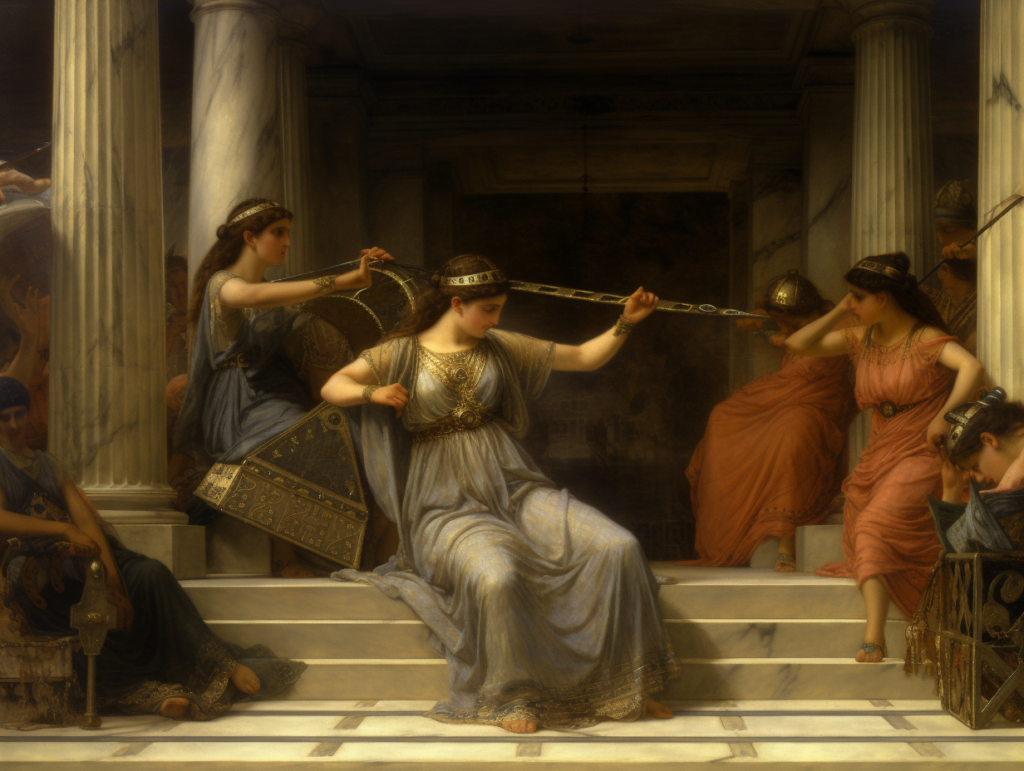Are you ready to unravel the mysterious myth of Cassandra and dive into the captivating world of Greek tragedy?
Get ready to discover the untold stories and hidden lessons behind the tragic prophecies.
In this article, we will explore the curse of ignored prophecy, the eternal debate of fate versus free will, and the profound power of prophecy in Greek tragedies.
Brace yourself for a journey that will challenge your beliefs and ignite your desire for freedom.
Key Takeaways
- Cassandra’s prophecies were accurate and terrifying, but they were dismissed and ignored by those around her.
- Ignoring prophecies and warnings can have devastating consequences, as seen in the Fall of Troy and the tragedies of Oedipus Rex and Julius Caesar.
- Greek tragedies explore the tension between fate and free will, highlighting the fine line between desires and predetermined paths.
- The myth of Cassandra serves as a cautionary tale about the power of knowledge, the frustration of being ignored, and the importance of creating spaces where everyone’s voice can be heard.
The Tragic Prophecies of Cassandra
You’ll be captivated by Cassandra’s chilling and accurate predictions of doom and destruction. Cassandra, a tragic figure from Greek mythology, possessed the gift of prophecy. However, her curse was that no one ever believed her foresight. Despite her desperate pleas, the people around her dismissed her warnings, leading to catastrophic consequences.
Cassandra’s prophecies weren’t just ordinary predictions; they were precise and terrifying. She foresaw the fall of Troy, the death of her family members, and the ruin of her beloved city. Cassandra’s words were like an eerie echo, reverberating through the hearts of those who dared to listen. Her prophecies were a clarion call, a desperate attempt to avert the impending disaster that loomed over them.
But why did no one listen? It wasn’t because Cassandra lacked credibility or evidence. It was because people feared the truth she spoke. The truth was a threat to their freedom, challenging their perception of the world and forcing them to confront their deepest fears. The people preferred to live in blissful ignorance, clinging to false hopes rather than face the harsh reality of Cassandra’s prophecies.
Cassandra’s tragic story serves as a reminder of the dangers of turning a blind eye to the truth. It teaches us that freedom isn’t just about the absence of physical restraints; it’s about embracing knowledge, accepting uncomfortable truths, and taking responsibility for our actions. Only then can we truly be free from the chains of ignorance and forge our own destiny.
Exploring the Curse of Ignored Prophecy
You can’t ignore the devastating consequences that occur when prophecies are dismissed and warnings go unheeded. Throughout history, there have been numerous examples of individuals and societies who paid a heavy price for ignoring the warnings of seers and prophets.
Here are three chilling tales that serve as a reminder of the curse of ignored prophecy:
- The Fall of Troy: The Trojan War could have been avoided if the Trojans had heeded the warning of Cassandra, daughter of King Priam. Despite her accurate prophecies, her words were dismissed as madness, leading to the destruction of the city and the downfall of the Trojan empire.
- The Plague of Thebes: In Sophocles’ play ‘Oedipus Rex,’ the city of Thebes suffers from a devastating plague. Oedipus, the king, is warned by the blind prophet Tiresias that the plague is a result of his own sins. However, Oedipus refuses to accept the truth, leading to further tragedy and suffering.
- The Death of Julius Caesar: In Shakespeare’s play ‘Julius Caesar,’ the Roman leader is warned by a soothsayer to ‘beware the Ides of March.’ Ignoring this warning ultimately leads to his assassination and the chaos that ensues.
These stories serve as cautionary tales, reminding us of the importance of paying heed to prophecies and warnings. Ignoring them can have dire consequences, as fate and free will collide in Greek tragedy.
Fate Vs. Free Will in Greek Tragedy
Explore the timeless debate of fate vs. free will in Greek tragedy and uncover the profound implications it has on the lives of tragic heroes. In Greek mythology, the concept of fate, or “moira,” played a significant role in determining the destiny of individuals. It was believed that even the most powerful heroes were subject to the whims of the gods. However, there was also a belief in free will, the idea that individuals had the power to shape their own destinies. This debate between fate and free will is evident in many Greek tragedies, where tragic heroes are faced with impossible choices and must navigate the fine line between their own desires and the predetermined paths set before them.
To better understand the implications of this debate, let’s take a look at a comparison between fate and free will in Greek tragedy:
| Fate | Free Will |
|---|---|
| Predetermined | Self-determined |
| Inescapable | Choices and decisions |
| Controlled by gods | Control over one’s actions |
As we can see, the concept of fate implies a lack of control and agency, while free will suggests the ability to make choices and decisions. Greek tragedies often explore the tension between these two opposing forces, highlighting the tragic consequences that arise when individuals attempt to defy their predetermined destinies.
The debate of fate vs. free will in Greek tragedy raises thought-provoking questions about the nature of human existence and the limits of personal agency. It forces us to confront the idea that our lives may be shaped by forces beyond our control, yet also challenges us to embrace the power we have to shape our own destinies. These themes continue to resonate with audiences today, as we grapple with the complexities of our own lives and the choices we make.
With an understanding of the debate between fate and free will, we can now delve into the lessons we can learn from the myth of Cassandra and how they apply to our own lives.
Lessons From the Myth of Cassandra
While exploring the myth of Cassandra, you’ll discover valuable lessons about the consequences of knowledge and the limitations of being heard.
Cassandra, blessed with the gift of prophecy, was cursed with never being believed. This tragic tale holds important insights for those who desire freedom and seek to make their voices heard.
- The Power of Knowledge: Cassandra’s gift of foresight allowed her to see into the future and understand the consequences of actions. This reminds us of the power that knowledge holds and the impact it can have on our lives. It serves as a reminder that with knowledge comes responsibility.
- The Burden of Unheard Voices: Cassandra’s curse of never being believed highlights the frustration and helplessness that comes with being ignored. It serves as a cautionary tale for those who are marginalized or silenced in society. It reminds us of the importance of creating spaces where everyone’s voice can be heard and valued.
- The Dangers of Ignorance: The tragic fate of Troy, which Cassandra foresaw but couldn’t prevent, serves as a reminder of the consequences of ignoring or dismissing knowledge. It teaches us the importance of listening to those who’ve valuable insights and the dangers that come with disregarding their warnings.
Unveiling the Power of Prophecy in Greek Tragedy
Delve into the captivating world of Greek tragedy and uncover the profound power of prophecy in shaping the tragic narratives. Greek tragedy, with its gripping tales of fate and destiny, often revolved around the concept of prophecy. The ancient Greeks believed that prophecies held the key to understanding the future and the consequences of human actions. These prophecies, delivered by oracles or seers, were seen as powerful forces that shaped the course of events in the tragic stories.
To truly grasp the significance of prophecy in Greek tragedy, let us explore the table below that highlights some of the most renowned prophecies and their impact on the tragic narratives:
| Prophecy | Tragic Narrative |
|---|---|
| The prophecy of Oedipus killing his father and marrying his mother | The tragedy of Oedipus Rex |
| The prophecy of the fall of Troy | The tragedy of The Trojan Women |
| The prophecy of the downfall of the House of Atreus | The tragedy of Agamemnon |
| The prophecy of the death of Achilles | The tragedy of The Iliad |
| The prophecy of the fate of Medea’s children | The tragedy of Medea |
These examples illustrate how prophecies played a pivotal role in driving the tragic events and influencing the choices made by the characters. They created a sense of inevitability and foreboding, amplifying the tragedy and heightening the emotional impact on the audience.
The power of prophecy in Greek tragedy lies in its ability to reveal the consequences of human actions and to challenge the notion of free will. It forces us to contemplate the intricate relationship between fate and choice, and the eternal struggle between human desires and the forces beyond our control. Through the power of prophecy, Greek tragedy provides a cautionary tale about the limitations of human agency, reminding us that even in the face of prophecy, we have the freedom to shape our own destinies.







